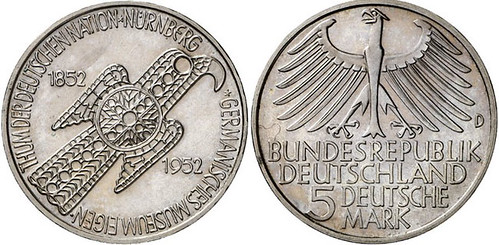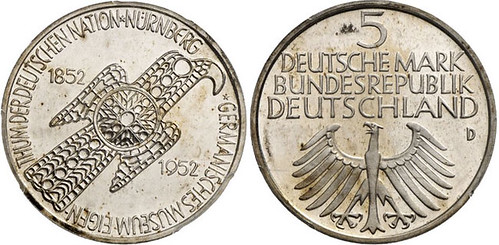
PREV ARTICLE
NEXT ARTICLE
FULL ISSUE
PREV FULL ISSUE
1952 ‘GERMANISCHES MUSEUM’ COMMEMORATIVE COIN
On May 15, 2015 Ursula Kampmann published an article in Coin Update (based on a coin being offered in June by Künker auctions)
about the first commemorative coin of the Federal Republic of Germany. Here's an excerpt. -Editor
In August 1952, the German National Museum in Nuremberg celebrated its 100th anniversary. The then Federal President Theodor Heuss, in his capacity as Chairman of the Administrative Board of the National Museum, thought that this jubilee would offer a splendid opportunity to show the public, both at home and abroad, that Germany had indeed changed. At the place where the Nazis used to hold their Nuremberg rallies, he celebrated German culture, and demanded in his programmatic opening speech that the city of Nuremberg ought to shake off its bad reputation, which originated in the recent past, and that its intellectual and its artistic life ought to express itself again. The administration discussed of course supporting measures for this mega event. In a letter dating from July 3, 1952 – rather late, admittedly –, the Bavarian State Ministry of Education and Cultural Affairs pointed out “that the Federation should issue a commemorative coin on the occasion of the centennial, following the example of the world’s cultural states’ best practice. It would be not necessary that the coin would be issued on the day of the jubilee, as it would likewise attract attention, if it was issued in autumn 1952.” The decision of the Ministry of Finance was issued at the beginning of August so that the artists could then be invited to enter the competition. The date for the jury’s initial meeting had to be postponed a number of times because not every draft had been submitted in time. However, it was as early as October 9, 1952, that the draft of the Munich-based medalist Karl Roth was accepted, due to “the symbolic being concise and the formal being well-balanced and lucid”. It was a top-class jury. It consisted of the director of the German National Museum, the head of the Bavarian State Coin Collection as well as the head of the Bavarian Mint in Munich. The only thing they criticized was the side of the eagle which the artist was obliged to rework, therefore. Karl Roth complied and handed in a new draft which was then accepted unanimously. 
Pattern; Lot 4469 The reverse of the pattern that was not released, of which until now a plaster cast model was the only testimony, is markedly different from the actual coin. It shows the federal eagle and the inscription homogeneously distributed while in the accepted pattern the inscription is a bit unbalanced graphically and makes the eagle become a marginal figure. Since the alternative for the first German commemorative coin has finally shown up, everyone can form his own opinion about the taste of Federal President Theodor Heuss. 
Commemorative coin ‘Germanisches Museum’, as executed. Of all commemorative coins issued by the Federal Republic of Germany, the ‘Germanic Museum’ is the most expensive one. It is quite hard to get it in a perfect state of preservation. Yet when it does happen, the coin in question easily obtains a price considerably higher than 1,000 euros.
I agree with the author - the pattern was a nicer design. -Editor
To read the complete article, see:
Wayne Homren, Editor The Numismatic Bibliomania Society is a non-profit organization promoting numismatic literature. See our web site at coinbooks.org. To submit items for publication in The E-Sylum, write to the Editor at this address: whomren@gmail.com To subscribe go to: https://my.binhost.com/lists/listinfo/esylum All Rights Reserved. NBS Home Page Contact the NBS webmaster 
|